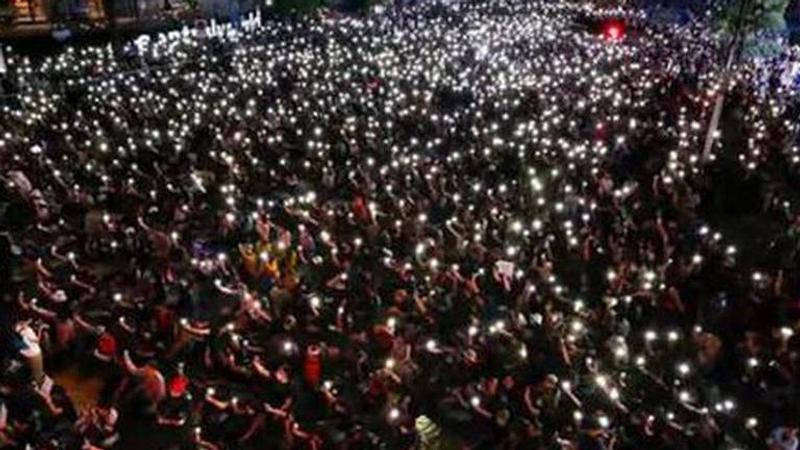Published 23:01 IST, October 26th 2020
Thai pro-democracy demo outside German embassy
Pro-democracy demonstrators in Thailand expanded their protests internationally on Monday, marching to the German Embassy to appeal to Angela Merkel's government to investigate whether Thailand's king has exercised political power during his extended stays in Bavaria.

Pro-democracy demonstrators in Thailand expanded their protests internationally on Monday, marching to the German Embassy to appeal to Angela Merkel's government to investigate whether Thailand's king has exercised political power during his extended stays in Bavaria.
The protesters acted while criticizing their own Parliament, which began a special two-day session earlier Monday to address political tensions resulting from the near-daily pro-democracy protests demanding the prime minister's resignation, constitutional changes and reforms to the monarchy.
They believe the king wields an inordinate amount of power in what is nominally a democracy under a constitutional monarchy.
The scrutiny and public criticism of the monarchy that has been displayed by some of the protesters is unprecedented in a country where the royal institution has been considered sacrosanct.
It has also led royalists to stage their own counter rallies and to denounce the protesters for raising the issue, increasing the risk of confrontation.
The protesters, estimated by an Associated Press journalist to number between 5,000 and 10,000, defied police warnings that they constituted an illegal assembly and marched to the embassy in an effort to bring attention to the time King Maha Vajiralongkorn spends in Germany.
The king in recent weeks has been in Thailand with a busy schedule of ceremonial events.
"For the last so many years we have seen so many injustices taking place in the country. I think this is likely to be a critical moment for change," said one protestor, Sukatat Leknimit, as the march began, underlining the sense many have of the unprecedented nature of current events.
Lines of police guarded the embassy entrance but there was never any sense that the situation might turn ugly.
"The era of change has arrived. The flowing stream of democracy cannot be stopped," a group of protestors read in unison, standing in front of the embassy gates.
"When the sky is golden bright the people will rise to greatness in the land. Down with feudalism. Long live the people!" they shouted and led the rally in raising three-fingered salutes, their symbol of defiance.
Three protestors entered the embassy to present a letter on Monday night asking that Germany investigate whether the king "has conducted Thai politics using his royal prerogative from German soil or not."
It said such action could be considered a violation of Germany's territorial sovereignty and suggested that its government consider the protesters' request with the aim of bringing the king back to Thailand to restore the country "to the path of the truthful constitutional monarchy."
In addition to asking whether the king is carrying out his official royal duties in Germany, the letter provocatively echoed points on which the protesters have previously criticised the king.
Germany is seen as receptive to their entreaties.
The German government already brought up the issue in early October, when Foreign Minister Heiko Maas, responding to a question in Parliament, expressed concern over any political activities the king might be conducting in the country.
On Monday in Berlin, Maas spoke again, telling reporters the government was following developments in Thailand and was aware of the demonstrations and "people taking to the streets for their rights."
He added that he also was watching the king's activities in Germany.
"We have been examining this not only in recent weeks, but we are continuing to examine it in the long term, and if there are things we feel to be unlawful, then that will have immediate consequences," Maas said.
Vajiralongkorn has for years spent significant time in Germany, but it only became an issue after the death of his father, King Bhumibol Adulyadej, in 2016.
Bhumibol was king for seven decades, and though he traveled extensively on state visits in the early years of his reign — including being welcomed with a ticker tape parade in New York City — he left the country only once after the 1960s, and that was an overnight stay in neighbouring Laos.
Vajiralongkorn's ability to spend time abroad has been made easier by changes his office sought and received to the current constitution that no longer require him to appoint a regent when away from the kingdom.
Defaming the monarchy can be punished by up to 15 years in prison under Thailand's tough lese majeste law.
Updated 23:01 IST, October 26th 2020




